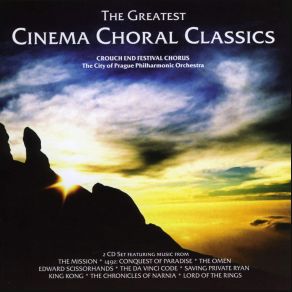The Greatest Cinema Choral Classics
Download links and information about The Greatest Cinema Choral Classics by Crouch End Festival Chorus, City Of Prague Philharmonic. This album was released in 2006 and it belongs to Traditional Pop Music, Theatre/Soundtrack, Choral genres. It contains 26 tracks with total duration of 02:17:27 minutes.

|
|
|---|---|
| Artist: | Crouch End Festival Chorus, City Of Prague Philharmonic |
| Release date: | 2006 |
| Genre: | Traditional Pop Music, Theatre/Soundtrack, Choral |
| Tracks: | 26 |
| Duration: | 02:17:27 |
| Buy it NOW at: | |
| Buy on iTunes $19.99 | |
Tracks
[Edit]| No. | Title | Length |
|---|---|---|
| 1. | Excalibur - O Fortuna (From "Carmina Burana") | 2:46 |
| 2. | Agnus Dei (From "Platoon") | 6:14 |
| 3. | Battle of the Heroes (From "Star Wars: Revenge of the Sith") | 4:14 |
| 4. | Kyrie for the Magdalene (From "The Da Vinci Code") | 3:52 |
| 5. | The Riddle of Steel / Riders of Doom (From "Conan the Barbarian") | 6:02 |
| 6. | 1492: Conquest of Paradise | 5:07 |
| 7. | Concert In E-Minor (From "The Double Life of Veronique") | 5:05 |
| 8. | The Empire State Building / Beauty Killed the Beast (From "King Kong") | 6:02 |
| 9. | On Earth As It Is In Heaven (From "The Mission") | 3:33 |
| 10. | End Credits (From "The Abyss") | 5:11 |
| 11. | Dry Your Tears, Afrika (From "Amistad") | 3:38 |
| 12. | Only the Beginning of the Adventure (From "The Chronicles of Narnia: The Lion, the Witch and the Wardrobe") | 6:38 |
| 13. | Suite (With Chorus) [From "The Lion In Winter"] | 7:38 |
| 14. | Suite for Choir and Orchestra (From "The Omen") | 11:50 |
| 15. | Evenstar (From "The Lord of the Rings: The Two Towers") | 6:59 |
| 16. | Main Title / Ice Dance (From "Edward Scissorhands") | 5:29 |
| 17. | Resurrection (From "Passion of the Christ") | 4:49 |
| 18. | Duel of the Fates (From "Star Wars: The Phantom Menace") | 4:10 |
| 19. | In Memoriam (From "Les Choristes") | 5:35 |
| 20. | Main Title / End Title (From "The Last Valley") | 6:04 |
| 21. | The Mission (From "The Sum of All Fears") | 5:41 |
| 22. | Exsultate Justi (From "Empire of the Sun") | 5:01 |
| 23. | Sanctus (If..) [From "Missa Luba"] | 2:46 |
| 24. | Prelude (Choral Version) [From "How the West Was Won"] | 3:15 |
| 25. | Hymn to the Fallen (From "Saving Private Ryan") | 6:03 |
| 26. | Non Nobis Domine (From "Henry V") | 3:45 |
Details
[Edit]Reynold da Silva's Silva Screen Records specializes in re-recordings of the scores of films, usually using the City of Prague Philharmonic Orchestra and, when choral parts are called for, Britain's Crouch End Festival Chorus. Silva Screen then packages and repackages the results in a variety of forms, including collections organized by composer or by some theme. Da Silva's concept for this particular compilation is simple: he has singled out a group of choral pieces, drawn from music written for or used in a wide range of films from Alfred Newman and Ken Darby's "Prelude" to How the West Was Won (1962) to Richard Harvey's "Kyrie for the Magdelene" from The Da Vinci Code (2006). At least from the selections here, it seems that when film composers write for choruses, for the most part they have one of two ideas in mind. Adapting their music from traditional choral styles, they are usually going for something inspiring, if not downright quasi-religious, in tone, or they are trying to scare the bejesus out of moviegoers. In the former category, a good example is Ennio Morricone's "On Earth as It Is in Heaven" from The Mission (1986), a film that, after all, concerns Jesuit missionaries. Perhaps the best example here of the latter is Jerry Goldsmith's "Suite" from The Omen (1976), for which annotator James Fitzpatrick thoughtfully prints a few lyrics, such as "Hail the anti-Christ, Hail Satan." (Why haven't those Christian fundamentalists who harried Ozzy Osbourne and Judas Priest ever gone after Goldsmith?) There are, however, exceptions to these generalizations. John Williams' setting for the poem "Dry Your Tears Afrika" from Amistad (1997) sounds influenced by Ladysmith Black Mambazo, and is warmer and more intimate than most of what is found on the album. And Danny Elfman does some characteristically off-beat and imaginative things with "Main Title & Ice Dance" from Edward Scissorhands (1990). But for the most part, the movie view of choirs, as represented here, seems to be that they exist to ooh and ahh or intone something that sounds like Latin to call down the wrath or the glory of God (or his counterpart) on the poor movie characters.